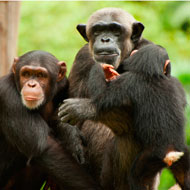Governments vote to save world’s migratory wildlife

World governments have voted to give chimpanzees additional protection.
Chimpanzees, leopards and lions should be given additional protection, governments attending a UN wildlife conference have agreed.
The agreement was reached at the Convention of Migratory Species (CMS), which took place in Manila, Phillippines (23 to 28 October). The week-long conference concluded that 34 species of animal are to receive special protection, including 12 mammals, 16 birds and six species of fish.
Bradnee Chambers, executive secretary of CMS, described the conference as a ‘real game changer’ for the Convention. “It has helped to convey the message that the future of migratory wildlife is integral to our future and that we all have responsibility to act,” he said.
Therese Mundita Lim, director of the Biodiversity Migration Bureau, added that migratory animals play a critical role in our planet’s ecosystem. “They act as pollinators, control pests and are a source of food and income. They are all an inspiration for people here in the Philippines and all around the world,” she said.
The CMS Conference in Manila was the largest-ever meeting in the 38-year history of the Convention. Other animals that will receive special protection include the Gobi bear, whale shark and the giraffe.
Four species of Lasiurus bat, the African Wild Ass - the most endangered wild equid in the world - and Przewalski’s horse are also due to receive special protection.



 The BSAVA has opened submissions for the BSAVA Clinical Research Abstracts 2026.
The BSAVA has opened submissions for the BSAVA Clinical Research Abstracts 2026.